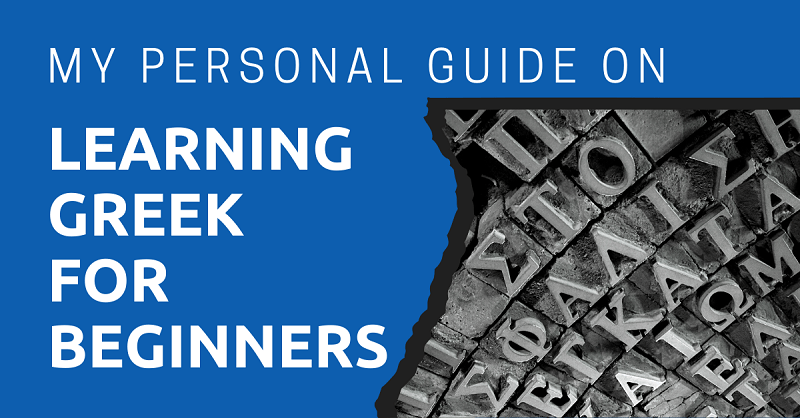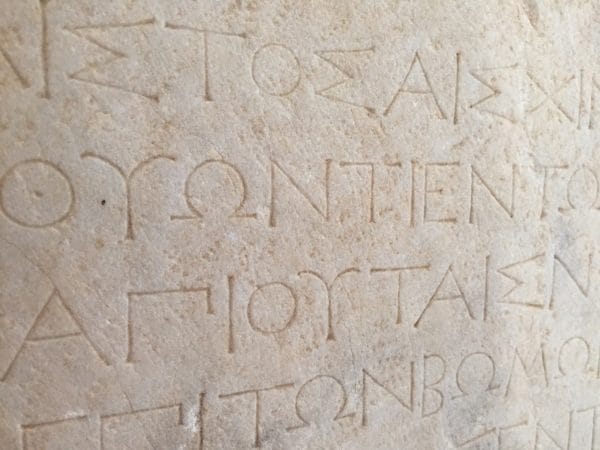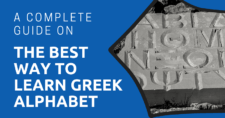
I fell in love with Greece the moment I arrived in the country. I felt like I had been dropped into a magical world somewhere between Europe and the Middle East. It seemed like the colors were brighter, the food more delicious, and the people more interesting than anywhere I’d been before. When I heard people speaking Greek, the sounds were foreign and intriguing.
During my first days in Greece, I listened carefully to friends having a conversation and thought they were solving the problems of the world because it all sounded so serious. When I asked what they were talking about, they’d tell me they were discussing something mundane such as choosing the right pair of socks for the winter. I was hooked and knew I needed to learn the language.
Greeks are lively and animated, and they love to talk. They are very happy to teach you a bit of the amazing language they are so proud of. Many Greeks speak English very well, which makes getting around Greece a breeze. But even if you’re coming to Greece (or Cyprus) for just a short vacation, learning the language can make it more exciting and meaningful.
You can get right at it by checking out “Learn Greek Online – GreekPod101“. It’s a great resource tool that I used to get me on the fast track to learning Greek. It helped me learn the Greek alphabet and diphthongs, which then helped me read more efficiently, build my vocabulary, and practice pronunciation — all so I wouldn’t feel shy when speaking with native speakers.
If you’re planning to visit or live in a foreign country, you might be intimidated at first. However, once you learn to communicate in the local language, you’ll feel more comfortable in your new environment. And if you’re looking to learn Greek in particular, you’ve come to the right place.
Greek isn’t the easiest language to learn, especially for native English speakers, but I have some tips, tricks, and resources that will help get you started — and hopefully hooked — on learning Greek as a beginner.
This article will take approximately 16 minutes to read. Don't have the time right now? No worries. You can email the ad-free version of the article to yourself and read it later!
Disclaimer: This article may include links to products or services offered by ExpatDen’s partners, which give us commissions when you click on them. Although this may influence how they appear in the text, we only recommend solutions that we would use in your situation. Read more in our Advertising Disclosure.
Contents
Is Greek Difficult to Learn?
Greek, the oldest recorded living language in the world, is at least 3,400 years old, while the Greek alphabet has been used for around 2,800 years.
The Greek language is divided into six different periods:
- Proto-Greek
- Mycenean
- Ancient
- Koine
- Byzantine
- Modern
Today, the official language of Greece and Cyprus, Standard Modern Greek, has evolved greatly since ancient times. And while it’s still a complex language, Modern Greek isn’t as difficult to learn as its preceding forms.
Because Greek is a distinct language that doesn’t have a close relationship with other languages, it might be more challenging for some people to learn, especially English speakers. The U.S. Foreign Service Institute’s language difficulty ranking has Greek at a category IV (out of five). This means that it typically takes someone 44 weeks or 1,100 hours to become fluent in Greek.
I totally agree with the institute’s assessment because I became fluent in Greek in my first nine months of living here. Of course, everyone is different, and how fast you learn depends on your learning style and how much you work on it.
Here’s a look at a few ways Greek might challenge a beginning learner:
The Greek Alphabet
The Greek alphabet looks different, but most letters are familiar, and there are only 24 of them!

I believe that learning to read, write, and pronounce the letters of the Greek alphabet is a great place to start learning. Not only does it give you an important tool for independent learning, but it helps you learn the language faster.
Check out the our article on how to learn Greek alphabet to learn it fast and easy.
Grammar
If you’re serious about learning a new language, you have to get a good grasp on the language’s grammar basics. Greek grammar can be challenging, and how deep a dive you want to take into learning it depends on your language goals. In my experience as a beginner, learning some of the basic principles helps a lot. After that, just listening to native speakers, reading as much as possible, and practicing speaking can make grammar more instinctive for you.
Here’s a look at some of the basic principles of Greek grammar to get you started:
- Word order is predominately subject-verb-object.
- Adjectives generally go before nouns.
- Nouns are either male, female, or neuter.
- Nouns are either singular or plural.
- Nouns have five cases and three declensions – I know, this sounds Greek to me!
- Adjectives agree with their nouns in gender, number, and case.
- There are two articles – definite and indefinite. Both types agree with the noun in gender and case, and the definite article also agrees in number.
- Personal pronouns aren’t necessary but can be used for emphasis.
- Verbs indicate person (three persons in each number), number (singular and plural), voice (active and passive), tense (eight tenses), and mood.
- Verb conjugation comes at the end of the verb.
One of the books I used when I was learning grammar is “Modern Greek Grammar Notes for Absolute Beginners” by Maria Poulopoulou. The first chapter focuses on reading and writing, the alphabet, pronunciation, intonation, and phonetics. The rest of the book deals with grammar and vocabulary.
Pronunciation
For me, the most difficult letter to pronounce in a word is the Greek “r” (ρ). That’s because it’s produced by flapping your tongue against the roof of your mouth and giving a trill, something that’s foreign to me. When I say Greek words with a “tr” combination, it’s a sure giveaway that I’m not a native speaker.
Fortunately, Greek words are pronounced as they’re written — another reason why learning to recognize and pronounce Greek letters is so important.
Word intonation can be a bit of a challenge, especially if you’re learning by listening to native speakers and trying to catch the accented syllable audibly. In written Greek, every word has an accent mark on the stressed syllable — another case for learning to read. A trick to remembering which syllable is accented is by overstressing it when you’re reading or practicing speaking. For example, the Greek word for “apple” is μήλο (milo). The accent is on the first syllable, so if you are trying to remember how to pronounce “milo” correctly, say ME-lo. Really force the accent while practicing and you’ll remember it more easily.
Getting pronunciation right is a matter of repetition and practice. You don’t need to be perfect, you just want people to understand you, so give it a go and don’t be shy!
Best Way to Learn Greek
I guess there isn’t an exact equation for learning a new language successfully, but there are common components that can help you get started on learning Greek faster. The way I learned worked for me, but you can mix these steps up a bit and find a method that works best for you.
Get to Know the Greek Letters
Because I’m a visual learner, I knew that for me to be successful, I had to “see” the language to understand and learn it more efficiently. This meant a lot of writing and reading, so I started out by learning the letters of the Greek alphabet, the diphthongs, and double consonants. This was important for pronunciation and reading comprehension.
Most people are familiar with some of the letters in the Greek alphabet, especially the first two – alpha (α) and beta (β). But did you know that the letter beta (β) is pronounced “vita” in Greek? That means that wherever there’s a beta (β) in a word, it has a “V” sound. For example, the word biology in English, is viologia (βιολογία) in Greek. To get the English “b” sound, “m” (μ) and “p” (π) are combined: μπ = b.

For me, learning how to read was a good tool for building my vocabulary. I would see words on signs, billboards, in magazines, etc., and I could associate them with the images. For example, I learned the word for milk (γάλα) when I saw a cow and milk carton on a sign. It might seem like a slow process, but it’s a fact that when you associate new words with an image, you remember them easier.
Read my guide on how to learn Greek alphabets to find out more on how you can learn it yourself.
Learn How to Count
The second thing I learned after the letters of the alphabet were the numbers and units of weight measurement, like kilogram and gram. I did this because I wanted to be able to do my own shopping. These days, there are more self-serve grocery stores, but a few years ago you needed to ask a clerk at the deli counter, in the produce department, at the butcher, or bakery to give you what you wanted. To get a half kilo of cheese, a quarter kilo of ham, or five kilos of potatoes, I needed to know how to ask for it.
Numbers are also important to recognize when dealing with money. When I first landed in Greece, I handed everyone a 20 Euro note when I needed to pay for something small. After getting a few sideways glances and a handful of change for a pack of gum, I knew I needed to get busy learning the numbers.
Surround Yourself with the Language
I learned Greek while I was living in Greece, so total immersion wasn’t difficult for me. Of course, I listened to people chatting and talking all around me, but I also spent a lot of time alone listening to the news, watching TV shows, listening to music, and reading children’s books.
I also concentrated on listening to what people were saying when buying single items like bread from a bakery, or fruit from a greengrocer. Learning this way is easier because there’s an association or context.
If you’re learning Greek at home before taking a trip to Greece or Cyprus, try listening to music and watching videos in Greek as much as possible.
Also, if you have a friend who already speaks Greek, hang out more and spend time practicing your new words and sentences. It’s also a great time to do more lessons with GreekPod101!
Work on Building a Vocabulary
I’ve been living in Greece for a few years now and I’m constantly adding new words to my vocabulary list, but I learned most of the words I know in the first nine months of being here. The Greek language has over 70 million words, but language experts say that the average native speaker knows between 10,000 and 15,000. They also say that a beginner can complete a variety of sentences by learning between 250 and 500 words. That’s not difficult for a start, but you can consider yourself advanced and able to carry on a conversation when you know between 1,000 and 3,000 words in Greek.

In the beginning, I simply wrote new words in a notebook in the order I was learning them. This turned out to be too random and overwhelming, so I re-wrote them in another notebook separated into categories. I’d put them in easy groups like the rooms in a home, types of food, action verbs, adjectives — you get the idea.
Every time I added 20 new words to my list, I’d write them on flashcards and add them to my pile of cards. When I felt confident that I had learned a word well, I removed it from the pack of flashcards.
What I didn’t know at the time, but I do now, is that I was practicing a technique called spaced repetition. This is a method that helps you memorize more information in less time (and without a lot of effort). You review new, or more difficult, words more frequently than older, easier words.
Another thing I wish I had known back then; you don’t need to use paper flashcards. There are now easy-to-use apps like one called Anki, or GreekPod101. You can download them to your phone and go over your new words whenever you have a free time, such as when you’re on a bus or at the dentist’s office.
Talk and Listen A Lot
Learning a new language is just like learning a new sport or hobby. The more you practice, the better you get at it.
If you can find a person, or a group of people, to meet and chat with regularly, that’s ideal. Greeks are very serious about coffee, and they can spend hours sitting in a café sipping and talking. It’s a good bet that you won’t have trouble finding willing Greeks to help you practice your language skills over a cup of coffee. And when you’re not doing the talking, you can listen. Be aware of words you recognize in their conversations and try to figure out what they’re talking about, turn it into a guessing game and you’ll have more fun while you’re “working” hard at learning.
You might find a friend who’d like to learn English (or your native language) in exchange for Greek lessons. Set dates for organized lessons and split your time between the two languages. This is a great opportunity to use writing skills too, as you can send each other text messages in your target languages. These types of language lessons let you practice all the learning skills: reading, writing, speaking, and listening. And they’re fun too.
Enroll in a Class
For some learners, having an experienced language teacher is the best way to learn efficiently. I signed up for Greek lessons at a university in Athens after I had been learning on my own for a while and I don’t regret my decision. By taking formal lessons, I had the chance to learn proper grammar and build a more sophisticated vocabulary. I also practiced my writing and reading skills, which I wasn’t doing enough on my own.
Formal lessons given by native Greek-speaking teachers provide you with an organized journey towards learning the language and gaining fluency. Lessons also provide more discipline and a feeling of accountability.
Any Greek language lessons that are worth your time, money, and effort should also include interesting lessons about Greek culture, history, traditional music, dance, food, customs, and modern life in the country. I thoroughly enjoyed my experience in the school that I went to, and I’d recommend it to anyone who was looking for this type of learning.
A lot of classrooms are online now too, so if you can’t get to a physical class, virtual learning is a great option.
GreekPod101 is a good choice for a virtual classroom experience if you’d rather learn from home.
Now, on to You
Using online learning tools, like the ones I’ve mentioned above, is great for beginners who want to get started with learning Greek before setting out for Greece or Cyprus. Once you get to the country, you can dive into the real world of native Greek speakers and carry on learning faster.
Greeks are super friendly and willing to help anyone trying to speak their native tongue. In fact, they really get a kick out of it, so don’t be shy!
Learning Greek, even if you are a beginner, can bring you closer to the people and their rich culture. It’s a way to gain a different, deeper perspective of a complex country that you might not be able to fully appreciate without knowing a bit of the language.
If you don’t have a lot of time to spend on grammar, don’t feel frustrated. Learn what’s important for making your daily life more comfortable in your new country. Even if you never get past the basics, knowing a few words can help you connect with people in their homeland.
Learning a new language is rewarding and it can empower you with confidence, so you can enjoy every minute of your new experiences.






